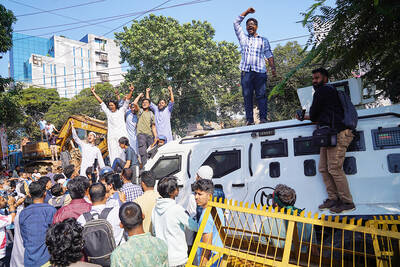Outside Havana, a combine belonging to a private Vietnamese company is harvesting rice, directly farming Cuban land — in a first — to help address acute food shortages in the country. The Cuban government has granted Agri VAM, a subsidiary of Vietnam’s Fujinuco Group, 1,000 hectares of arable land in Los Palacios, 118km west of the capital.
Vietnam has advised Cuba on rice cultivation in the past, but this is the first time a private firm has done the farming itself.
The government approved the move after a 52 percent plunge in overall agricultural production between 2018 and 2023, according to data from the Center for the Study of the Cuban Economy at the University of Havana. The rice numbers are even worse.

Photo: AFP
Total rice production dropped from 300,000 tonnes in 2018 to 55,000 tonnes in 2021, in the depths of the COVID-19 pandemic. The number is slowly recovering, authorities say. Rice is a staple of the local diet, with Cubans consuming 60kg of rice per person per year.
During a media visit to its rice fields in May, an Agri VAM representative said the harvest yield to date is seven tonnes per hectare, “but we want more.” That number dwarfs the tonne and a half yield-per-hectare of Cuban growers.
Vietnam in the 1980s experienced the kind of food shortages that Cuba is going through now. Today, the Southeast Asian country is the world’s third exporter of rice and a valued consultant to other rice-growing nations.
“The climate and the temperature are very good for agriculture,” but Cuban growers lack necessary farming products such as fertilizers, the Agri VAM representative told reporters.
Although Agri VAM can import some materials, it faces other obstacles such as fuel shortages, transportation problems and frozen assets, Cuban economist Omar Everleny Perez said.
Agri VAM and other foreign firms in Cuba might be making profits, but “they cannot transfer them abroad because the banks have no liquidity, no foreign currency,” Perez said.
An independent Cuban media outlet, 14ymedio, recently published excerpts of a letter sent in May in which Agri VAM asked the Cuban government to unfreeze US$300,000 in its account at the state-owned International Financing Bank.
Vietnam’s state media in May quoted Vietnamese Deputy Minister of Agriculture Nguyen Quoc Tri asking the government in Havana “to eliminate investment barriers that Vietnamese companies encounter.”
Agri VAM and Cuban officials did not respond to a request for comment.
Cuba is mired in an acute economic crisis and desperately in need of foreign investment. Vietnam and other allies have shown interest.
Last month, Cuban Prime Minister Manuel Marrero Cruz announced that Havana was taking measures “to energize foreign investment” as he authorized “wholly foreign-owned companies” in the hotel sector.
After three years of promises, Russian Deputy Prime Minister Dmitry Chernyshenko announced in May that Russian businesses want to invest US$1 billion in Cuba. Moscow would give them preferential financing rates, he said.

DISASTER: The Bangladesh Meteorological Department recorded a magnitude 5.7 and tremors reached as far as Kolkata, India, more than 300km away from the epicenter A powerful earthquake struck Bangladesh yesterday outside the crowded capital, Dhaka, killing at least five people and injuring about a hundred, the government said. The magnitude 5.5 quake struck at 10:38am near Narsingdi, Bangladesh, about 33km from Dhaka, the US Geological Survey (USGS) said. The earthquake sparked fear and chaos with many in the Muslim-majority nation of 170 million people at home on their day off. AFP reporters in Dhaka said they saw people weeping in the streets while others appeared shocked. Bangladesh Interim Leader Muhammad Yunus expressed his “deep shock and sorrow over the news of casualties in various districts.” At least five people,

LEFT AND RIGHT: Battling anti-incumbent, anticommunist sentiment, Jeanette Jara had a precarious lead over far-right Jose Antonio Kast as they look to the Dec. 14 run Leftist candidate Jeannette Jara and far-right leader Jose Antonio Kast are to go head-to-head in Chile’s presidential runoff after topping Sunday’s first round of voting in an election dominated by fears of violent crime. With 99 percent of the results counted, Jara, a 51-year-old communist running on behalf of an eight-party coalition, won 26.85 percent, compared with 23.93 percent for Kast, the Servel electoral service said. The election was dominated by deep concern over a surge in murders, kidnappings and extortion widely blamed on foreign crime gangs. Kast, 59, has vowed to build walls, fences and trenches along Chile’s border with Bolivia to

It is one of the world’s most famous unsolved codes whose answer could sell for a fortune — but two US friends say they have already found the secret hidden by Kryptos. The S-shaped copper sculpture has baffled cryptography enthusiasts since its 1990 installation on the grounds of the CIA headquarters in Virginia, with three of its four messages deciphered so far. Yet K4, the final passage, has kept codebreakers scratching their heads. Sculptor Jim Sanborn, 80, has been so overwhelmed by guesses that he started charging US$50 for each response. Sanborn in August announced he would auction the 97-character solution to K4

DEATH SENTENCE: The ousted leader said she was willing to attend a fresh trial outside Bangladesh where the ruling would not be a ‘foregone conclusion’ Bangladesh’s fugitive former prime minister Sheikh Hasina yesterday called the guilty verdict and death sentence in her crimes against humanity trial “biased and politically motivated.” Hasina, 78, defied court orders that she return from India to attend her trial about whether she ordered a deadly crackdown against the student-led uprising that ousted her. She was found guilty and sentenced to death earlier yesterday. “The verdicts announced against me have been made by a rigged tribunal established and presided over by an unelected government with no democratic mandate,” Hasina said in a statement issued from hiding in India. “They are biased and politically motivated,” she